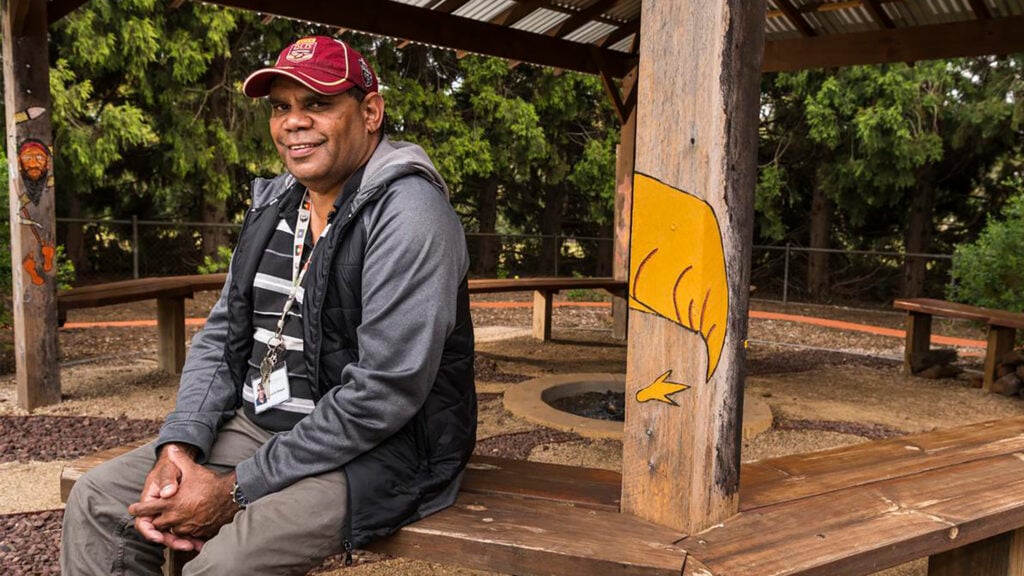
Interview by Barry Lenihan, General Manager, First Nations for Mercy Community.
As the sun starts to rise on National Reconciliation Week, I thought I’d highlight a First Nations team member who has achieved a great deal for Mercy Community. Laurie Stewert (pictured above) has been part of the Mercy Community family since 2008 and during this time, he has chaired our first ever Mercy Cultural Connections Group, helped increase our First Nations workforce and created a strong inclusive culture within our workplace.
These achievements have led to his recent promotion and the first appointment of such a role in Mercy Community of Manager First Nations, where Laurie will strategically lead and embed the First Nations voice in our programs throughout the Toowoomba and Greater Downs Region. I wanted to discover what National Reconciliation Week means to him as a proud Kooma/Murrawarri man. How he plans to celebrate the history, culture, and achievements of Aboriginal and Torres Strait Islander peoples and any advice he may have for Mercy Community employees to help continue the conversation.
Firstly, what does National Reconciliation Week mean to you?
It means everything! It’s all about First Nation people coming together with others to form an alliance.
Which is something I’m glad to say I didn’t even have to look for, it found me – as even though my journey hasn’t been easy, I’ve had white allies to help me along the way.
As the theme of Reconciliation Week this year is ‘Be a Voice for Generations’, do you have any advice for First Nations young people looking for a career?
Always ensure you research the organisation you want to join. Do they have a strong cohort of Aboriginal and Torres Strait Islander employees? If so, you can seek guidance from them, or professionals in your own mob. That way you can walk in confidently that you’re going to be respected as a human being rather than the colour of your skin.
How does National Reconciliation Week impact your life outside of work?
Amongst many things, this week helps people feel more comfortable talking about any issues they may have and as a respected leader in the community locals feel comfortable coming to me if they’re having a hard time. I’m a reserve grade Rugby League Coach, (go The Bears) and I always ensure that my focus isn’t on coaching, it’s on the welfare of the players on and off the pitch, that’s my real responsibility. As a result of that, it’s great when First Nations kids come up to me in the shops and say, “Hey Uncle, I need help with something” and I either do my best to help them or refer them to the services that Mercy Community offers.
Always ensure you research the organisation you want to join. Do they have a strong cohort of Aboriginal and Torres Strait Islander employees? If so, you can seek guidance from them, or professionals in your own mob. That way you can walk in confidently that you're going to be respected as a human being rather than the colour of your skin.
How are you celebrating the week?
Well on 30th May, I’m heading to the Mercy Community Toowoomba Reconciliation Lunch, to be held in house, which we’ve also extended to groups outside of our organisation. In turn, I’ve also had external organisations asking me to attend their events, which is great because it means they’re taking an interest in the week and what it means to their staff and the wider community.
How about employers, how can they do better?
Develop a Reconciliation Action Plan, to make everyone accountable. They should also seek advice and have a yarn with any Aboriginal and Torres Strait Islander employees they may have, to discover their aspirations for diversity within the business. Or if there’s no representation within their business, they can look at others who are doing it well and emulate some of their initiatives.
How is our business developing change?
Mercy Community has just under 50 First Nations employees across the state at any given time over the last few years and I hope to help that number grow, particularly as around half of the people we support are Indigenous. I’m grateful that our CEO Fritha Radyk has always been committed to inclusion, talking with Indigenous groups internally and externally to ensure our Reconciliation Action Plan will be a success.
And finally, where can people go to learn more about National Reconciliation Week?
Jump on the National Reconciliation Week Website, all the information you need should be there or you can check in with your local Aboriginal services.



